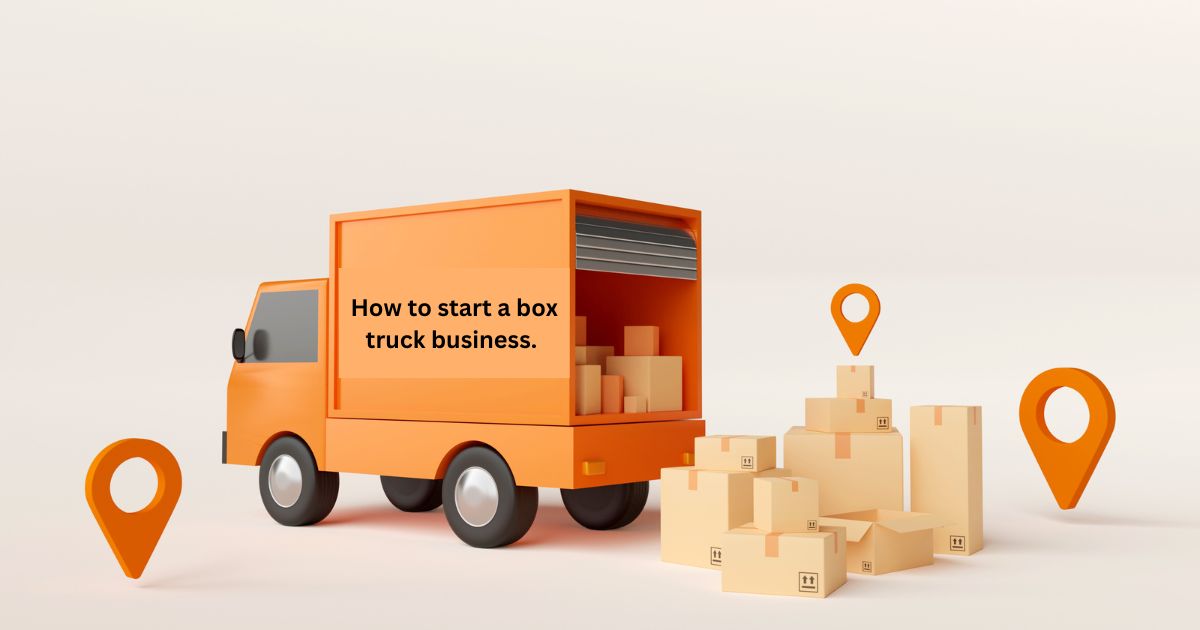A box truck business involves using medium to large-sized trucks with an enclosed cargo area, known as box trucks, to transport goods for various clients. These trucks are versatile and can be used for multiple services, including moving, delivery, and transportation of goods. If you’re considering how to start a box truck business, you’ll find that the enclosed cargo area provides protection for items from weather and theft, making box trucks a popular choice for businesses that require reliable and secure transportation.
Starting a box truck business offers numerous benefits. It provides the opportunity to enter a growing market with a steady demand for transportation services. This business model allows for flexibility, as you can choose the type of services you offer and scale your operations based on demand. Additionally, owning a box truck business can be financially rewarding, with potential for significant profit margins. The ability to operate locally or expand to regional and national markets adds to the business’s appeal.
The box truck industry is a vital component of the logistics and transportation sector. With the rise of e-commerce and the increasing need for efficient delivery services, the demand for box truck businesses is on the rise. Companies and individuals alike rely on box trucks for their transportation needs, from moving household items to delivering commercial goods. Understanding how to start a box truck business means recognizing that this industry is characterized by a diverse range of services, competitive pricing, and the potential for growth and innovation.
Market Research and Planning
Analyzing the Market Demand
Conducting thorough market research is crucial for understanding the demand for box truck services in your area. Analyze trends in the transportation and logistics sector, identify gaps in the market, and assess the needs of potential customers. Understanding the demand will help you tailor your services to meet market needs and identify opportunities for growth.
Identifying Target Customers
Identify your target customers by considering who would benefit most from your services. This can include individuals needing moving services, businesses requiring regular deliveries, and organizations that need transportation for special events. Understanding your target customers will help you develop marketing strategies and service offerings that cater to their specific needs.
Competitive Analysis
Conduct a competitive analysis to understand the strengths and weaknesses of your competitors. Identify key players in your market, analyze their services, pricing, and customer feedback. This information will help you differentiate your business and develop strategies to outperform competitors. Knowing your competition will also help you identify best practices and potential pitfalls to avoid.
Creating a Business Plan
A well-structured business plan is essential for the success of your box truck business. Your business plan should include:
Business Goals and Objectives
Define clear and achievable goals for your business. These goals can include short-term objectives, such as acquiring your first truck and customers, as well as long-term goals like expanding your fleet and service areas.
SWOT Analysis (Strengths, Weaknesses, Opportunities, Threats)
Conduct a SWOT analysis to identify your business’s strengths, weaknesses, opportunities, and threats. This analysis will help you understand your competitive position and develop strategies to leverage strengths, address weaknesses, capitalize on opportunities, and mitigate threats.
Legal Requirements and Licensing
Registering Your Business
Register your box truck business with the appropriate local, state, and federal authorities. Choose a business structure that best suits your needs, such as a sole proprietorship, partnership, LLC, or corporation. Registering your business will establish your company as a legal entity and ensure compliance with regulations.
Understanding Local, State, and Federal Regulations
Familiarize yourself with the regulations governing the transportation industry in your area. These regulations can include vehicle standards, safety requirements, and operational guidelines. Ensuring compliance with these regulations is essential to avoid legal issues and maintain a reputable business.
Obtaining Necessary Licenses and Permits
Acquire the necessary licenses and permits to operate your box truck business. This may include a commercial driver’s license (CDL), operating authority, and specific permits for transporting certain types of goods. Check with local authorities to determine the exact requirements for your area.
Insurance Requirements for Box Truck Businesses
Obtain comprehensive insurance coverage for your box truck business. This includes liability insurance, cargo insurance, and vehicle insurance. Adequate insurance coverage protects your business from potential risks and liabilities, ensuring the safety and security of your operations.
Financial Planning and Funding
Estimating Startup Costs
Calculate the startup costs for your box truck business. When learning how to start a box truck business, it’s essential to account for various expenses, including purchasing or leasing trucks, obtaining licenses and permits, insurance, marketing, and initial operational expenses. Understanding your startup costs will help you budget effectively and secure the necessary funding.
Budgeting for Initial and Ongoing Expenses
Create a detailed budget for your business’s initial and ongoing expenses. This budget should account for fuel, maintenance, insurance, salaries, marketing, and other operational costs. Effective budgeting ensures you manage your finances efficiently and maintain profitability.
Funding Options: Loans, Grants, and Investors
Explore various funding options to finance your box truck business. This can include bank loans, small business grants, and investments from private investors. Each funding option has its advantages and requirements, so choose the one that best suits your business needs and financial situation.
Financial Management and Accounting Practices
Implement robust financial management and accounting practices to track your income, expenses, and profitability. Use accounting software to manage your finances, generate reports, and ensure compliance with tax regulations. Proper financial management is crucial for the long-term success of your business.
Acquiring Box Trucks
Choosing the Right Box Truck for Your Business
Select the appropriate box truck for your business needs. Consider factors such as size, payload capacity, fuel efficiency, and reliability. The right truck should meet your operational requirements and provide a balance between cost and performance.
Buying vs. Leasing Box Trucks
Decide whether to buy or lease your box trucks. Buying offers long-term cost savings and asset ownership, while leasing provides flexibility and lower upfront costs. Evaluate your financial situation and business goals to determine the best option for your business.
Inspecting and Evaluating Box Trucks
Thoroughly inspect and evaluate box trucks before purchasing or leasing. Check for mechanical issues, wear and tear, and overall condition. Conducting a detailed inspection ensures you invest in reliable and safe vehicles that meet your business’s needs.
Maintaining Your Box Trucks
Implement a regular maintenance schedule to keep your box trucks in optimal condition. This includes routine inspections, servicing, and repairs. Proper maintenance ensures the safety, reliability, and longevity of your vehicles, minimizing downtime and operational disruptions.
Setting Up Operations
Hiring and Training Staff
Hire qualified staff to support your box truck business operations. This includes drivers, dispatchers, and administrative personnel. Provide comprehensive training to ensure your team understands their roles, safety protocols, and customer service standards.
Establishing Operational Procedures
Develop standard operating procedures (SOPs) for your business. These procedures should cover all aspects of your operations, from scheduling and dispatching to loading and unloading. Clear and efficient SOPs streamline your operations and ensure consistency.
Also Read: jablw.rv
Scheduling and Dispatching
Implement a scheduling and dispatch system to manage your deliveries and services efficiently. Use software tools to optimize routes, track deliveries, and communicate with drivers. Effective scheduling and dispatching enhance your operational efficiency and customer satisfaction.
Implementing Safety Protocols
Establish and enforce safety protocols to protect your staff and customers. This includes regular vehicle inspections, driver training, and adherence to transportation regulations. Prioritizing safety minimizes risks and ensures the smooth operation of your business.
Marketing Your Box Truck Business
Creating a Brand Identity
Develop a strong brand identity for your box truck business. This includes creating a logo, choosing a business name, and developing a brand message. A clear and consistent brand identity helps you stand out in the market and attract customers.
Developing a Marketing Strategy
Create a comprehensive marketing strategy to promote your business. This should include both online and offline marketing tactics to reach a wide audience.
Online Marketing: Website, Social Media, SEO
Build a professional website to showcase your services and provide information to potential customers. Utilize social media platforms to engage with your audience and promote your business. Implement SEO strategies to improve your website’s visibility in search engine results, attracting more traffic and customers.
Offline Marketing: Flyers, Business Cards, Networking
Distribute flyers and business cards to promote your services locally. Attend networking events and industry conferences to build relationships and gain referrals. Offline marketing efforts complement your online strategies and help you reach a broader audience.
Building Customer Relationships
Focus on building strong relationships with your customers. Provide exceptional customer service, communicate effectively, and address any issues promptly. Building trust and loyalty with your customers leads to repeat business and positive word-of-mouth referrals.
Pricing and Service Offerings
Determining Your Pricing Strategy
Develop a competitive pricing strategy for your services when considering how to start a box truck business. Consider factors such as market rates, operational costs, and the value you provide to customers. Your pricing should be fair, transparent, and profitable, ensuring you attract and retain customers.
Types of Services to Offer
Diversify your service offerings to meet the needs of different customers. This can include:
Local and Long-Distance Moving
Offer moving services for individuals and businesses, catering to both local and long-distance moves. Ensure your trucks are equipped to handle various types of items, from household goods to office equipment.
Delivery Services
Provide delivery services for businesses that need reliable transportation for their products. This can include regular deliveries, last-mile deliveries, and expedited shipping services.
Specialty Services (e.g., Fragile Items, Heavy Equipment)
Offer specialized services for transporting fragile items, heavy equipment, and other unique goods. This requires additional training and equipment but can attract a niche market willing to pay a premium for these services.
Technology and Tools
Essential Software and Tools for Managing Operations
Invest in essential software and tools to streamline your operations and improve efficiency.
Fleet Management Software
Use fleet management software to monitor and manage your vehicles. This software helps you track vehicle performance, schedule maintenance, and optimize routes.
Scheduling and Dispatch Tools
Implement scheduling and dispatch tools to manage your deliveries and services. These tools help you coordinate with drivers, optimize routes, and ensure timely deliveries.
GPS and Tracking Systems
Equip your trucks with GPS and tracking systems to monitor their location and status. These systems enhance safety, improve route planning, and provide real-time updates to customers.
Adopting Technology for Efficiency and Customer Satisfaction
Adopt technology solutions to enhance your operational efficiency and customer satisfaction. This includes automated booking systems, digital invoicing, and customer feedback tools. Leveraging technology improves your service quality and sets you apart from competitors.
Scaling and Expanding Your Business
Strategies for Growth
Develop strategies for scaling and expanding your box truck business. This can include increasing your fleet size, expanding your service areas, and diversifying your service offerings.
Adding More Trucks and Expanding Service Areas
Invest in additional trucks to increase your capacity and serve more customers. Expand your service areas to reach new markets and grow your customer base. Careful planning and investment are essential for successful expansion.
Diversifying Service Offerings
Diversify your services to attract new customers and increase revenue. This can include adding new types of delivery services, offering storage solutions, or providing specialized transportation for unique goods.
Forming Partnerships and Collaborations
Form partnerships and collaborations with other businesses and organizations. This can include partnering with moving companies, e-commerce platforms, and logistics providers. Collaborations help you reach new customers and enhance your service offerings.
Challenges and How to Overcome Them
Common Challenges in the Box Truck Business
Identify common challenges in the box truck business, such as competition, fluctuating fuel prices, and regulatory compliance. Understanding these challenges helps you develop strategies to address and overcome them.
Solutions and Best Practices
Implement best practices to overcome common challenges, particularly in how to start a box truck business. This can include adopting fuel-efficient practices, staying updated with regulatory changes, and continuously improving your services. Best practices ensure the smooth operation of your business and enhance your competitiveness.
Case Studies of Successful Box Truck Businesses
Study case studies of successful box truck businesses to learn from their experiences. Analyze their strategies, challenges, and successes to gain insights and inspiration for your own business. Case studies provide valuable lessons and real-world examples of effective business practices.
Customer Service Excellence
Importance of Customer Service
Customer service is a critical component of your box truck business. Providing exceptional customer service enhances customer satisfaction, builds loyalty, and drives repeat business. Focus on delivering a positive customer experience at every touchpoint.
Training Staff to Provide Exceptional Service
Train your staff to provide exceptional customer service. This includes communication skills, problem-solving abilities, and a customer-centric mindset. Well-trained staff are better equipped to handle customer inquiries, address issues, and create a positive impression.
Handling Customer Complaints and Feedback
Implement a process for handling customer complaints and feedback. Address complaints promptly and professionally, and use feedback to improve your services. Proactively seeking and acting on feedback demonstrates your commitment to customer satisfaction and continuous improvement.
Safety and Compliance
Ensuring Compliance with Regulations
Ensure your business complies with all relevant regulations and standards. This includes vehicle safety standards, driver qualifications, and operational guidelines. Compliance with regulations protects your business from legal issues and enhances your reputation.
Implementing Safety Measures
Implement safety measures to protect your staff, customers, and assets. This includes regular vehicle inspections, safety training for drivers, and adherence to transportation safety protocols. Prioritizing safety minimizes risks and ensures the smooth operation of your business.
Regular Inspections and Maintenance
Conduct regular inspections and maintenance of your box trucks to ensure they are in optimal condition. Regular maintenance prevents breakdowns, reduces repair costs, and enhances the safety and reliability of your vehicles. A well-maintained fleet is crucial for the success of your business.
Sustainability and Environmental Considerations
Adopting Eco-Friendly Practices
Adopt eco-friendly practices to reduce your environmental impact. This can include using fuel-efficient vehicles, optimizing routes to minimize fuel consumption, and reducing waste. Eco-friendly practices benefit the environment and appeal to environmentally conscious customers.
Reducing Carbon Footprint
Implement strategies to reduce your business’s carbon footprint. This can include investing in electric or hybrid trucks, using renewable energy sources, and offsetting emissions through carbon credits. Reducing your carbon footprint demonstrates your commitment to sustainability and can enhance your brand reputation.
Sustainable Business Strategies
Develop sustainable business strategies that balance profitability with environmental responsibility. This can include long-term investments in green technologies, partnerships with sustainable suppliers, and initiatives to promote environmental awareness. Sustainable strategies ensure the long-term success and resilience of your business.
Industry Trends and Future Outlook
Current Trends in the Box Truck Industry
Stay informed about current trends in the box truck industry. This can include advancements in technology, changes in customer preferences, and shifts in market dynamics. Staying updated with trends helps you adapt your business strategies and stay competitive.
Predictions for the Future
Understand predictions for the future of the box truck industry. This can include the increasing adoption of electric vehicles, the growth of e-commerce, and the demand for faster and more efficient delivery services. Anticipating future trends helps you prepare and position your business for long-term success.
Staying Competitive in a Changing Market
Develop strategies to stay competitive in a changing market. This can include continuous improvement of your services, adoption of new technologies, and proactive customer engagement. Staying competitive requires innovation, agility, and a commitment to excellence.
Conclusion
Recap the key points discussed in this guide on How to Start a Box Truck Business. Highlight the importance of market research, legal compliance, financial planning, operational efficiency, marketing, and customer service. Reinforce the significance of safety, sustainability, and staying competitive in the industry.
Encouragement and Final Tips for Aspiring Entrepreneurs
Encourage aspiring entrepreneurs to take the first step in starting their box truck business. Provide final tips for success, such as staying informed, continuously improving, and maintaining a customer-centric approach. Emphasize the potential for growth and profitability in the box truck industry.
Next Steps in Starting Your Box Truck Business
Outline the next steps for how to start a box truck business. This can include finalizing your business plan, securing funding, acquiring your first truck, and launching your marketing efforts. Providing clear and actionable next steps helps aspiring entrepreneurs move forward with confidence.









